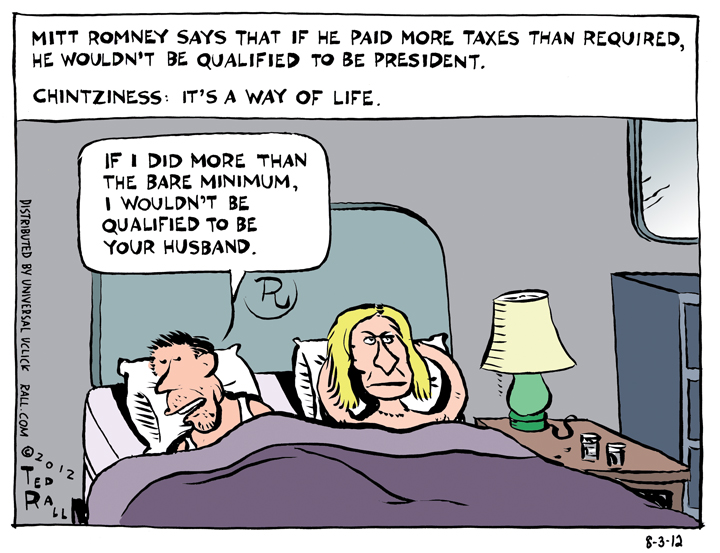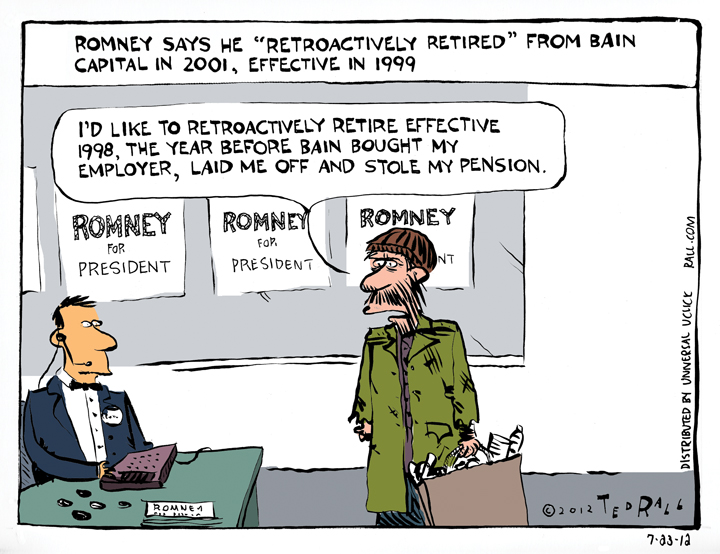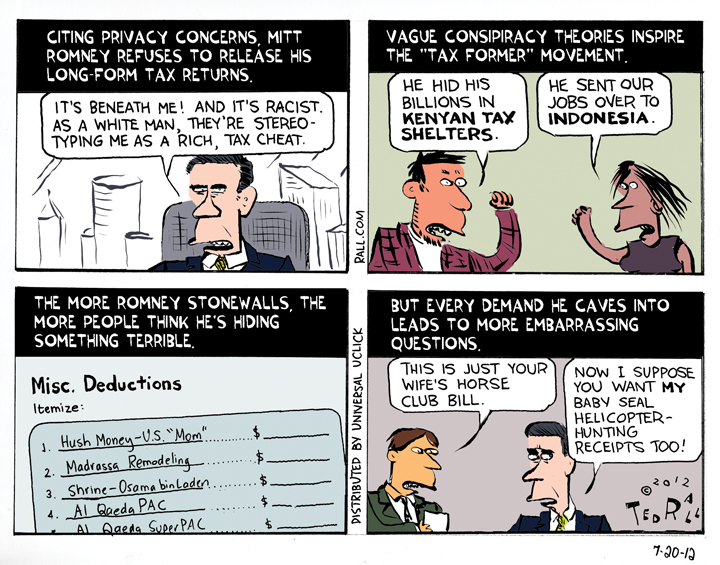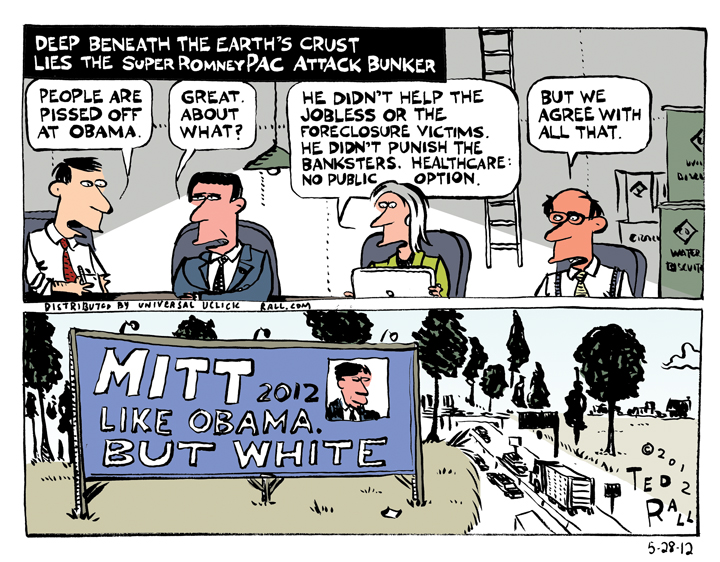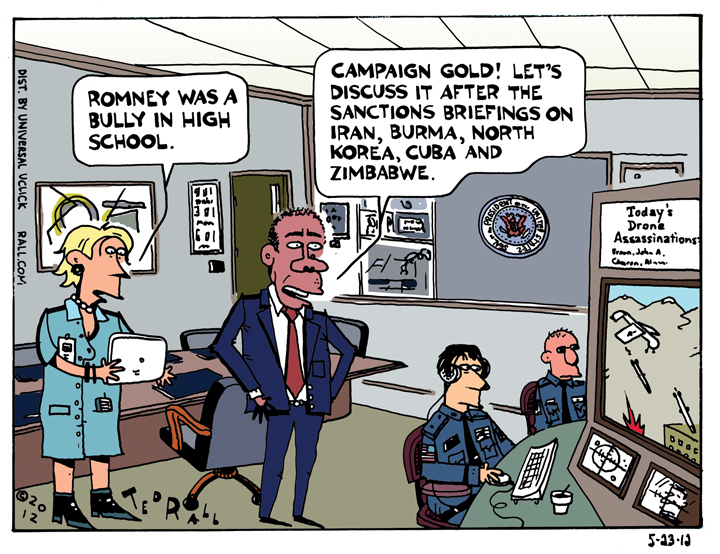In one of the most overtly racist statements ever made by a presidential candidate, Mitt Romney attributes the difference in GDP and average income between Israel and the Palestinian Occupied Territories not to the occupation and trade embargo, but to Palestinian’s supposedly inferior culture.
SYNDICATED COLUMN: Iran – Because Two Wars Aren’t Enough
Why Doesn’t Anyone Call Out Romney for Warmongering?
Mitt Romney had a barnburner of a weekend in Israel. The GOP nominee apparent shared his unique combination of economic and anthropological wisdom, attributing the fact that Israel’s GDP and average income is many times higher than those of the Palestinian Occupied Territories to Israelis’ superior “culture.”
As if spewing one of the most overtly racist lines in recent presidential campaign history wasn’t enough, eschewing “containment” (read: “diplomacy”), Romney also endorsed a preemptive Israeli military strike against Iran in order to prevent the latter’s nuclear program—Israel’s own, illegal nuclear weapons stockpile is OK since it’s a U.S. ally—from moving forward.
“We have a solemn duty and a moral imperative to deny Iran’s leaders the means to follow through on their malevolent intentions,” Romney said, stating that “no option should be excluded.”
He didn’t say how he knew the intentions of Iran’s leaders. Clairvoyance? Bush had it too.
Though Mitt slightly walked back his campaign’s sabre rattling, the message was clear. If he is elected, Israel will receive a blank check to begin a war against Iran, one of the most well-equipped military powers in the Middle East—a conflagration in which the United States could easily wind up getting dragged into. (In a subsequent interview he reiterated that “we have all options on the table. Those include military options.”)
Most criticism focused on Romney’s flouting of the traditional proscription against candidates questioning a sitting president’s foreign policy while visiting foreign soil. Though, to be fair, the differences between his and President Obama’s approach to Israel and Iran are tonal and minor.
As usual with the U.S. media, what is remarkable is what is going unsaid. Here we are, with the economy in shambles and the public worried sick about it, the electorate tired of 12 years of war against Afghanistan and nine against Iraq, yet Romney—who could be president six months from now—is out ramping up tensions and increasing the odds of a brand-new, bigger-than-ever military misadventure.
Warmongering has gone mainstream. It’s a given.
In a way, Romney’s willingness to risk war against Iran is merely another example, like the car garage and dressage, of how clueless and out of touch he is. Most Americans oppose war with Iran. For that matter, so do the citizens of the country on whose behalf we’d be killing and dying, Israel. But even Romney’s Democratic opponents give him a pass for Romney’s tough-guy act on Iran.
The reason for the somnolent non-response is obvious: it’s nothing new. Year after year, on one foreign crisis after another, American presidents repeatedly state some variation on the theme that war is always an option, that the military option is always on the table. You’ve heard that line so often that you take it for granted.
But did you know that “keeping the military option on the table” is a serious violation of international law?
The United States is an original signatory of the United Nations Charter, which has the full force of U.S. law since it was ratified by the Senate in 1945. Article 51 allows military force only in self-defense, in response to an “armed attack.” As Yale law and political science professor Bruce Ackerman wrote in The Los Angeles Times in March, international law generally allows preemptive strikes only in the case of “imminent threat.” In 1842 Secretary of State Daniel Webster wrote what remains the standard definition of “imminent,” which is that the threat must be “instant, overwhelming, leaving no choice of means and no moment for deliberation.” The enemy’s troops have massed on your border. They have superior force. What must be done to stop them is evident. There’s no time for diplomacy.
Iran’s nuclear program doesn’t come close to this definition, even from Israel’s standpoint. Bruce Fein, deputy attorney general under Reagan, told Fairness and Accuracy in Reporting’s Extra! Magazine: “It is nothing short of bizarre to claim, as the Obama Administration is doing, that the mere capability to make a bomb is justification for a preemptive attack. That’s a recipe for perpetual war. Almost any country could have the capability to make a bomb. They are torturing the word ‘imminent’ to the point that it has no meaning.”
By endorsing an Israeli attack against Iran at a time when there is no proof that Iran has nuclear weapons, intends to develop them, or use them if it does, Romney is going farther than Obama, who has engaged in back-channel diplomacy.
The Allies’ main brief against the Nazi leaders tried at Nuremberg was not genocide, but that they had violated international law by waging aggressive war. Yet every American president has deployed troops in aggressive military actions.
Aggressive war hasn’t been good for America’s international image, the environment, our economy or the millions who have died, mostly for causes that are now forgotten or regretted. But unless we draw the line against reckless, irresponsible rhetoric like Romney’s, it will go on forever.
(Ted Rall’s new book is “The Book of Obama: How We Went From Hope and Change to the Age of Revolt.” His website is tedrall.com. This column originally appeared at NBCNews.com)
(C) 2012 TED RALL, ALL RIGHTS RESERVED.
SYNDICATED COLUMN: Where’s the Legacy?
Political Malpractice and Missed Opportunities under Obama
I’m on book tour, promoting “The Book of Obama: How We Went From Hope and Change to the Age of Revolt.”
In “The Book of Obama” I argue that Obama is America’s Mikhael Gorbachev. Like Gorby, The One (Oprah’s phrase) is the most progressive, decent and intelligent leader his system is willing and able to allow to rise to power; like the reformist of perestroika, Obama’s fundamental not-so-badness—coupled with his…ineffectiveness? cluelessness? conservatism? exposes the fact that the system is the problem. That voting for a better/less evil leader can’t bring about the changes we need, because what the 99% view as problems—unemployment, underemployment, the growing gap between rich and poor—are things that the system views as not merely desirable, but necessary. Its raison d’être.
Among progressives it’s a given that Obama has been a disappointment. At my signings people keep asking me: Why? Why hasn’t the president lived up to the hopes and dreams we invested in him? Sure, the Republicans have blocked him at every turn. But he doesn’t seem to try.
Why not? Is he a wimp? Or were liberals wrong about him—was Obama an establishment conservative from the start?
I don’t know what’s in Obama’s heart. Frankly, I don’t care. It’s all about policies: either you’re for good policies, or you’re not. If you are, you fight for them with everything you’ve got. If not…
Like most pundits, I tend to focus on the negative. So this week let’s look at Obama’s signature accomplishments, the things he actually did get done: healthcare reform, his statement support for gay marriage, and last week’s Dream Act Lite, his order that Department of Homeland Security stop pursuing the approximately 800,000 young people who were brought to the U.S. illegally.
It took three years for this President to do something that brought a smile to my face. So I owe him this: Nicely done, Mr. President. (Sure, it’s just a political ploy, a play for the Hispanic vote. But other things Obama should do, but won’t—unlimited unemployment benefits, assistance for foreclosure victims, a new WPA—would be popular too. Pandering to the people is called democracy.)
Millions of people—the lucky 800,000, their families and friends—finally have their foot in the door. Early signals from GOP bosses indicate reluctance, even if they win this fall, to revert to the bad old days of rounding up kids and deporting them to “homes” they don’t know, whose languages they don’t speak.
Yet, like so many of his more positive acts, it came later than it should. And it should have been built to last.
The Dream Act failed in December 2010, just after the Republican sweep in the Congressional midterms. It would have passed if not for the craven, bigoted “nay” votes of five Democratic senators spooked by the election results.
I keep thinking back to 2009. Democrats had both houses of Congress. A filibuster-proof majority in the Senate. Obama enjoyed a worshipful media. Sky-high public opinion polls. Why didn’t the president propose the Dream Act then, when it would probably have passed, sparing 800,000 kids terrible uncertainty—not to mention those who got swept up during the last three years? (While we’re at it: what’s the point of letting kids stay in the U.S. and deporting their parents?
Back in 2009, was Team Obama guilty of political ineptitude? Obsessive focus on healthcare? We don’t know. The result of their neglect of young immigrants amounted to political malpractice at least, bigotry at worst. (There were, after all, more deportations of illegals under Obama than under Bush.)
Worse than too little and/or too late, Obama’s announcement in support of gay marriage came so late that it might as well not have happened at all; by the time he spoke out, gay marriage had become a historical inevitability. Talk about political malpractice! What is more ineffectual than irrelevance? Like the Homeland Security directive on illegals, it came as big, good news to millions of people. But it could have been handled earlier, proactively, and—not incidentally—paying bigger dividends to the president’s reelection effort.
Less clear but with broader implications was healthcare reform. “Have you had enough of Obamacare?” Tim Pawlenty asked a crowd at a pro-Mitt Romney rally. “Yes!” they shouted. But there is no Obamacare. Not yet. Even if the Supreme Court doesn’t overturn the Administration’s biggest achievement, it doesn’t go into effect until 2014. After, perhaps, President Romney takes office. What was Obama thinking? If nothing else, wasn’t he worried about his historical legacy?
My guess is that he cares less about his legacy, or changing things, than the political horse race. He likes winning as an individual more than he cares about changing the world.
Obama has a few chances left to prove me wrong. He could still close Gitmo by executive order. He could also propose a federal law legalizing abortion, forcing the GOP to counter the 77 percent of Americans who told the most recent Gallup poll that they’re pro-choice. It would be a bold move, one that would resolve the decades-long legal limbo that has left abortion rights in the hands of the Supreme Court. Is Obama incapable of bravery? Of vision? Or is he using the threat of a Romney SCOTUS to threaten women into voting for him?
No one knows.
All we can do is consider the president’s actions.
(Ted Rall’s new book is “The Book of Obama: How We Went From Hope and Change to the Age of Revolt.” His website is tedrall.com. This column originally appeared at MSNBC.com)
(C) 2012 TED RALL, ALL RIGHTS RESERVED.
The Book of Obama: From Hope and Change to the Age of Revolt
How did a charismatic young president elected in an atmosphere of optimism and expectation lead the United States to the brink of revolution? From a chance encounter in the early 1980s to the Democratic primaries of 2007-08, I was one of the first to size up Barack Obama as we know him now: conservative, risk-averse and tone deaf. In The Book of Obama I revisit the rapid rise and dizzying fall of Obama–and the emergence of the Tea Party and Occupy movements–and draw a startling conclusion: We the People weren’t lied to. We lied to ourselves, both about Obama and the two-party system. We voted when we ought to have revolted. Here’s the story of what went wrong — and a prescription for real change.
In The Book of O(bama): From hope and change to the age of revolt, Rall lays out his case, and it’s a strong one, for why we should revolt instead of vote, how the only hope we have for real change in this country is to trash the broken Democratic-Republican duopoly and create something new that better serves a diverse nation. —Phoenix New Times
Political Analysis/History, 2012
Seven Stories Press Trade Paperback, 6″x9″, 240 pp., $14.95
To Order From Amazon: click here.
To Order A Personally Signed Copy directly from Ted:
“Ted Rall is a terrific journalist and a take-no-prisoners political cartoonist.”
—San Diego Union-Tribune


